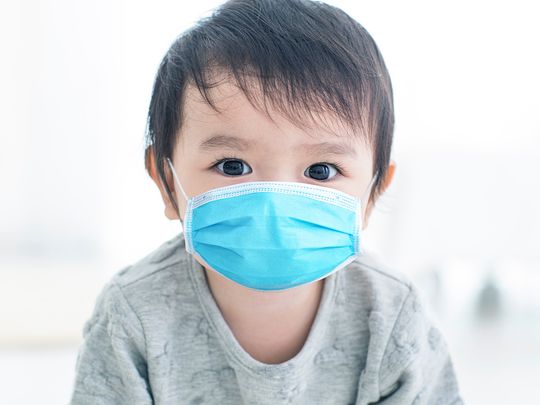
It is recommended that children wear face masks provided that they are more than two years old, announced Dr Omar Al Hammadi, the official spokesperson for the UAE Government, at a media briefing held in Abu Dhabi on Monday.
Dr Al Hammadi revealed that children are not immune from the virus, especially those who suffer from chronic diseases, noting that although children are less likely to develop severe symptoms, they are able to carry the virus and transmit it, so adequate precautions must be taken to save children from infection.
He explained that it is recommended that children wear masks, provided that they are more than two years old, and that they should not be wearing masks if they have difficulty breathing or do not have the ability to remove them themselves.
Different types of face mask
Dr Al Hammadi explained that there are different types of mask, the effectiveness of which varies from one type to another. He indicated that the surgical type is most common, while a fabric mask can also be used. These serve their purpose in the absence of surgical masks, preferably consisting of more than one layer. People are urged to make sure masks that can be reused are regularly washed.
Dr Al Hammadi said the need remains for everyone to wear masks, especially those suffering from respiratory symptoms, those who mix with COVID-19 patients, as well as those who care for the elderly and those who suffer from chronic diseases.
Read more
- UAE - COVID-19: How to protect children from the long-term impact of the pandemic
- UAE - COVID-19: What your child’s school day will look like this Autumn 2020
- COVID-19: Are kids actually allowed to have play dates in Dubai?
- UAE - COVID-19: All you need to know about children and face masks in the UAE
- UAE Coronavirus: Should your child wear a face mask?
How to wear a face mask safely
He further emphasised the importance of sterilization and washing hands before wearing a mask, while ensuring that the mask is bound tightly, but not so as to cause the wearer difficulty in breathing.
Dr Al Hammadi explained that the best way to remove a mask is to remove the strings around the ears without touching any part of the face, including the nose, mouth and eyes. Then the hands should be washed or sterilized, explaining that it is not recommended to leave the mask hanging under the neck or above the forehead.
Dr Al Hammadi advised people not to wear a mask if they have difficulty breathing or cannot remove it on their own for any reason.
Wearing a mask does not exempt people from physical distancing, as these are the two most effective weapons against the virus.
Immune system is 'backbone of protection' against COVID-19
Dr Al Hammadi explained that the immune system is the backbone of protection in the human body, as it forms the defensive cells that respond to viruses, noting that the immune system is exposed to weakness with age. This explains why the elderly suffer complications due to COVID-19.
Dr Al Hammadi stressed that a healthy lifestyle plays an important role in protecting the body and leads to the strengthening of the immune system, noting that it is necessary to protect it from negative external interventions that include smoking, sleep disorders, lack of exercise, weight gain and psychological factors, in addition to not eating a healthy diet of vegetables and fruits.
Dr Al Hammadi also warned against using products that claim to stimulate the immune system against the virus, as they often exploit people's fear and anxiety.
He stressed the need to continue to wear masks because of their ability to limit the spread of the virus, which is transmitted mainly through direct contact with the infected, and through spray coming from coughs and sneezes.
Face masks and swimming pools
Dr Al Hammadi answered several questions from the media during the briefing, where he explained that there is no scientific evidence to prove that the Coronavirus passes between people in seawater and swimming pools, especially if the swimming pools are sterile, because sterilization reduces the chance of the spread of viruses. He pointed out that the users of swimming pools must observe physical spacing for a distance of not less than two meters, while those with respiratory symptoms should refrain from using pools.
Dr Al Hammadi gave more important tips for swimming pool users, explaining that a mask should be worn as soon as they are out of the water.
Infection can occur at any time
As for close contact with relatives and friends if their COVID-19 result is negative, Dr Al Hammadi stressed the negative result means that the person was not infected at the time of the examination, and does not necessarily mean that they are still negative after a few days.
He noted that infection can occur at any time, even on the day of taking the sample, which means the need to follow precautionary measures and physical distance remains in all circumstances and and at all times
Advice in line with global recommendations
Dr Al Hammadi's recommendation on children wearing masks is in line with global health advice from the Centers for Disease Control and Prevention (CDC), which recommends all people who are two years of age and older wear a mask in public settings and when around people who don’t live in your household, especially when other social distancing measures are difficult to maintain.
“In general, [the medical community] feels that children should be wearing face masks just like adults,” says Dr Frank Esper, pediatric infectious diseases specialist at Cleveland Clinic Children’s. "We believe that children are as much at risk for acquiring the infection as well as spreading the infection as adults.”
Of course toddlers and younger children may not tolerate wearing a mask, says Dr Esper, in which case maintaining social distancing remains crucial – as it is for all of us, regardless of whether we are wearing a mask or not. “It is critical to emphasize that face masks alone are not enough to prevent spread or protective against infection,” says Dr Esper. “Maintaining two-metre social distancing and avoiding public areas remain important to slowing the spread of the virus.”
However, for UAE parents who are concerned about their three or four year old child not tolerating a face mask, it is important to note that it is not mandatory for anyone under the age of six years old to wear a face mask in the UAE. The UAE government website currently states that individuals who have been exempted from wearing a face mask in public are:
- Children under six years of age
- People of determination - those with cognitive, intellectual or sensory disorders or any impairments that prevent their ability to breathe or communicate, normally
- Those for whom masks can lead to sensory triggering (a medical report is needed to confirm the condition)
- Individuals who require supplemental oxygen or have severe respiratory issues or have difficulty breathing with a mask (medical report is needed to confirm the condition).








